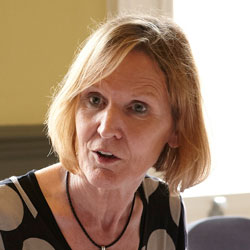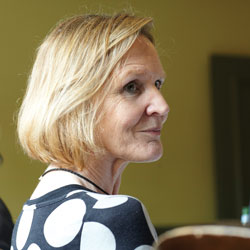Spotlight on the negotiator
From contractor confidence to commissioning relationships, Zoe Smeaton puts readers’ questions to C+D Senator and PSNC chief executive Sue Sharpe
Ask a C+D Senator
It's been a busy year for the pharmacy contract negotiator, with a revision to the NMS payment structure, an annual conference calling for all contractors to get behind services, and lingering problems over control of entry all on its agenda. Pharmacists have hardly minced their words in their reactions; here's how C+D Senator and PSNC chief executive, Sue Sharpe responded to your key queries.
 Starting on a positive note, @TinyMindHidden, on Twitter, wanted to know what Ms Sharpe would consider to be the three greatest PSNC successes of the past year.
Starting on a positive note, @TinyMindHidden, on Twitter, wanted to know what Ms Sharpe would consider to be the three greatest PSNC successes of the past year.
Sue Sharpe: I think protecting funding delivery levels against all the drives for cuts has to be a success. Also we have managed to secure the commissioning of the NMS and you've really got to look at that as an immense achievement – getting a service commissioned, and getting ministers' support for it, at a time when everybody is looking at cuts. The third one is that I do think we have managed to establish a real understanding of the value that commissioners can get from pharmacy. That may be a long-term role, but establishing the importance of that network of pharmacy and what it does in reducing burdens on the NHS is going to prove immensely important.
C+D: Is there any evidence that commissioners better understand pharmacy now? SS: We work on service negotiations with NHS Employers, and I think it would be right to say the skills, learning and knowledge they have with us are going to be picked up in the new commissioning environment, so they are really important people to build an understanding and a real enthusiasm for how we can use community pharmacies better. And we have got a very good understanding from them and a real appetite, assuming that the evidence proves the value of the NMS in the way that we are confident that it will, for developing that service and expanding the inputs that pharmacists can make into ensuring the effective use of medicines.
Sticking with the NMS, @haggerstonPharm on Twitter wanted to know how the payment structure was agreed. Others asked wider questions, with @TinyMindHidden questioning how contractors could have confidence in the negotiator following NMS payment problems and also asking whether Ms Sharpe would consider consulting more widely on future changes to remuneration.
C+D: How confident are you that you're pushing for what the sector wants? SS: It is really important to recognise that PSNC is not me and the core team here – PSNC has 30 people representing the profession and they include all the large multiples and all the supermarkets and our independent representatives. What's really important is for contractors to engage with their LPCs and make sure the LPCs feed into the regional representatives who will bring to PSNC the concerns, the views and the principle pressures that they are hearing on their patches.
C+D: Would you consider wider consultation with contractors on major changes? SS: We did consult when we had the ballot for the 2005 contract, and I think we need to ensure that if there is major change that the sector is behind it, yes. But I think it depends on how major it is – it's important to get that balance right between how we feed out through the LPCs and whether we go straight to the contractor base.
 C+D: So can you explain the original NMS payment structure, and might the need for a renegotiation have been prevented if more contractors had seen it earlier?
SS: The first thing is to understand why the NMS was different from the way in which MURs are funded, and it is because there is an absolute determination in the Department of Health and NHS Employers to move away from piecework funding. There is a real need for us to find ways of looking at practice service payments, and NMS targets were driven towards achieving that.
C+D: So can you explain the original NMS payment structure, and might the need for a renegotiation have been prevented if more contractors had seen it earlier?
SS: The first thing is to understand why the NMS was different from the way in which MURs are funded, and it is because there is an absolute determination in the Department of Health and NHS Employers to move away from piecework funding. There is a real need for us to find ways of looking at practice service payments, and NMS targets were driven towards achieving that.
We knew it was experimental and so we built in an early review. As we saw, some pharmacies weren't able, for whatever reason, to meet the minimum threshold. I think a contributing factor was that with all the PCT clustering there was less activity in shifting people from one drug to another, so there was a drop in the activity around medication change. And we have to recognise pharmacists were working to build the service into their practice, so maybe there were missed opportunities.
In any event, we built the review into the agreement and we went back very swiftly, as soon as we got data, and I would say it's evidence of the collaborative working we have that we were able to agree a system of funding that really helped remotivate pharmacists to build the service in. In terms of numbers of pharmacists that saw [the payment system ahead of the launch of the NMS], again I would come back to this representative nature of the committee, which people sometimes forget.
C+D: So can contractors have confidence in PSNC? SS: If – for reasons in large measure beyond our control – something goes wrong, you can count on us to get it right and to have the relationships with the people that we work with so that we've got a joint commitment to making it right.
Another key issue in recent months has been sustainability, as workloads continue to rise. Malcolm Fagelman, of Swift Chemists, Sheffield, said it wasn't possible to run a pharmacy with only one pharmacist, while Graham Phillips, of Manor Pharmacy (Wheathampstead) Ltd, asked how independents could stay afloat.
 C+D: A lot of independents are worried about their sustainability – will they be viable in the future?
SS: I really hope so, because I think they're an incredibly important sector and I think what they can do in terms of their responsiveness to local needs is immensely important. I think independents will need to get more help from organisations that can support them, and possibly start to look at contracting out some of the work – either to others within their teams or external help. I think the thing that is probably not sustainable is the independent trying to do the whole job himself in-house.
C+D: A lot of independents are worried about their sustainability – will they be viable in the future?
SS: I really hope so, because I think they're an incredibly important sector and I think what they can do in terms of their responsiveness to local needs is immensely important. I think independents will need to get more help from organisations that can support them, and possibly start to look at contracting out some of the work – either to others within their teams or external help. I think the thing that is probably not sustainable is the independent trying to do the whole job himself in-house.
C+D: So do you think it's possible to run a pharmacy with only one pharmacist now? SS: Yes, I really do. It will depend on the size of the pharmacy, of course, but I do think it's about skill mix and use of teams. What I don't think is possible is to have a pharmacy of any size operating without really good support staff.
And finally, another topic high on every contractor's concerns list: control of entry. Vanessa Roach, posting on Facebook, asked how much longer we'll have to wait for updated control of entry regulations. SS: There was an initial consultation that is sitting with ministers and I hope it will be very soon – it has been a massive destabilising factor. The answer is I just don't know, but it can't come soon enough.
Read the full interview with Sue Sharpe
Your contract questions answered – C+D Senators give their views
Q Based on my experiences, I would say it is criminally irresponsible for ministers and our professional representatives to imagine that an average pharmacy delivering all services and with the corresponding paperwork can be run by a single pharmacist. Do you think a pharmacy can be run by a single pharmacist?
Malcolm Fagelman, Swift Chemists, Sheffield
 A Yes, they can. But let's be real. Pharmacists don't run pharmacies – the team does. Legally pharmacists are critical, but while the pharmacists take legal responsibility for the pharmaceutical activity and quality of services, it is key that the wider pharmacy team is also well-trained and effective.
Ronan Brett, head of professional and external relations, Lloydspharmacy
A Yes, they can. But let's be real. Pharmacists don't run pharmacies – the team does. Legally pharmacists are critical, but while the pharmacists take legal responsibility for the pharmaceutical activity and quality of services, it is key that the wider pharmacy team is also well-trained and effective.
Ronan Brett, head of professional and external relations, Lloydspharmacy
 A An increase in prescription numbers, the launch of the NMS and delivering against rising consumer expectations mean the workload of pharmacists continues to increase. Pharmacists need to be delegating tasks appropriately and developing skills in the wider team. In some circumstances, especially where prescription volume is very high and/or the portfolio of services is heavily slanted to medicines advice and clinical services, two pharmacists can be an appropriate model.
Mike Holden, chief executive, National Pharmacy Association
A An increase in prescription numbers, the launch of the NMS and delivering against rising consumer expectations mean the workload of pharmacists continues to increase. Pharmacists need to be delegating tasks appropriately and developing skills in the wider team. In some circumstances, especially where prescription volume is very high and/or the portfolio of services is heavily slanted to medicines advice and clinical services, two pharmacists can be an appropriate model.
Mike Holden, chief executive, National Pharmacy Association
Q Should PSNC consider the merits of a wider consultation on proposed amendments to funding allowing contractors to input?
@TinyMindHidden, posted on Twitter
 A PSNC is comprised of representatives of contractors, all of whom have, according to its constitution, to be pharmacists. However, the concern that seems to lie behind this question is similar to the one that led Pharmacy Voice to suggest, in our prospectus, that the overall aims and objectives of the contract should be agreed between the DH and contractors in a framing document. This would set out the overall goals of the contract, against which future developments should be measured. In this way, the strategic direction would be clear to all.
Rob Darracott, chief executive, Pharmacy Voice
A PSNC is comprised of representatives of contractors, all of whom have, according to its constitution, to be pharmacists. However, the concern that seems to lie behind this question is similar to the one that led Pharmacy Voice to suggest, in our prospectus, that the overall aims and objectives of the contract should be agreed between the DH and contractors in a framing document. This would set out the overall goals of the contract, against which future developments should be measured. In this way, the strategic direction would be clear to all.
Rob Darracott, chief executive, Pharmacy Voice
 A PSNC is constituted with a board that represents all pharmacy contractors. Contractors should make their views known to their PSNC reps and reps should ensure contractors' voices are heard at PSNC board level. It's hard to see how further consultation with contractors would be productive. That said, on major issues requiring fundamental changes to the contract, there is a need to consult with the broader membership and I know PSNC would do this as and when required.
Ronan Brett, head of professional and external relations, Lloydspharmacy
A PSNC is constituted with a board that represents all pharmacy contractors. Contractors should make their views known to their PSNC reps and reps should ensure contractors' voices are heard at PSNC board level. It's hard to see how further consultation with contractors would be productive. That said, on major issues requiring fundamental changes to the contract, there is a need to consult with the broader membership and I know PSNC would do this as and when required.
Ronan Brett, head of professional and external relations, Lloydspharmacy
Click here for all the latest from the C+D Senate with details of the July meeting of the Senate coming soon

|
|
Worried about your pharmacy and the future of the sector? Or perhaps you'd just like some ideas on how to make your life easier? Whatever's on your mind, if you've got a question you'd like to put to the powers that be, we want to hear about it. Over the coming months we'll be putting more questions to the C+D Senators, so send your thoughts, queries and concerns to [email protected]




